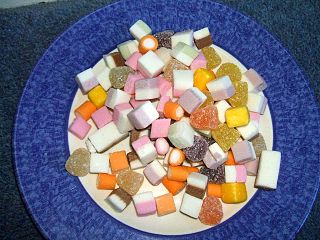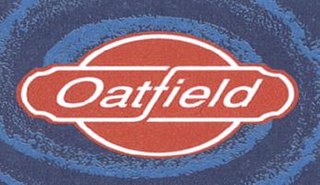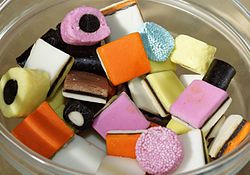
Confectionery is the art of making confections, which are food items that are rich in sugar and carbohydrates. Exact definitions are difficult. In general, however, confectionery is divided into two broad and somewhat overlapping categories: bakers' confections and sugar confections. The occupation of confectioner encompasses the categories of cooking performed by both the French patissier and the confiseur.

Jelly Babies are a type of soft sugar jelly sweets in the shape of plump babies, sold in a variety of colours. They were first manufactured in Lancashire, England, in the nineteenth century. Their popularity waned before being revived by Bassett's of Sheffield in Yorkshire, who began mass-producing Jelly Babies in 1918.

Liquorice or licorice is the common name of Glycyrrhiza glabra, a flowering plant of the bean family Fabaceae, from the root of which a sweet, aromatic flavouring is extracted.

Spangles was a brand of boiled sweets manufactured by Mars Ltd in the United Kingdom from 1950 to the early 1980s. They were sold in a paper packet with individual sweets originally unwrapped but later cellophane wrapped. They were distinguished by their shape which was a rounded square with a circular depression on each face.

Wine gums are chewy, firm pastille-type sweets originating from the United Kingdom. All brands have their own recipes containing various sweeteners, flavourings and colourings. Wine gums are popular in the United Kingdom, Canada, Ireland, South Africa and many Commonwealth nations, as well as several European countries. Common brands include Maynards, Bassett's, Haribo and Lion.

Liquorice or licorice is a confection usually flavoured and coloured black with the extract of the roots of the liquorice plant Glycyrrhiza glabra.

Love Hearts are a type of confectionery manufactured by Swizzels Matlow in the United Kingdom. They are hard, tablet-shaped sweets featuring a short, love-related message on one side of the sweet. They are an updated version of Victorian-era conversation lozenges.
Fruit-tella are chewy sweets similar to Sugus, Starburst and Chewits. They are made using real fruit juice, natural colours and natural flavours, sugar and gelatine. They are made by Perfetti Van Melle, the company that also manufactures Mentos and Chupa Chups.

George Bassett & Co., known simply as Bassett's, was a British confectionery company and brand. The company was founded in Sheffield by George Bassett in 1842. The company became a brand of Cadbury Schweppes in 1989. The brand's final owner was Mondelēz International, which merged the brand with Maynards to create Maynards Bassetts in 2016.

Dolly mixture is a British confection, consisting of a variety of multi-coloured fondant shapes, such as cubes and cylinders with subtle flavourings, and sugar-coated jellies.

Percy Pig is a British brand of pig-shaped gummy raspberry, strawberry, cherry and grape-flavoured confectionery products made under licence in Germany by Katjes for Marks & Spencer which first appeared in stores in 1992. More than £10 million was grossed between June 2009 and 2010 in Percy Pig sales in Marks & Spencer's UK branches alone. They contain just under 3.5% fruit juice and since May 2022 have been suitable for vegans.

Oatfield was a chocolate and confectionery manufacturer located in Letterkenny, County Donegal, Ireland. The company was the oldest confectionery manufacturer in Ireland.

Midget Gems are chewy, firm sweets similar to wine gums but much harder. They are manufactured from sugar and glucose syrup, corn starch and/or various other starches, animal gelatin, and various colourings and flavouring.
Sports Mix is a confectionery product manufactured in the UK under the brand-name of Maynards Bassetts, which is itself part of the Cadbury UK brand now owned by Mondelēz International and was formerly produced by Lion Confectionery. Both Maynards and Lion are owned by Cadbury UK, formerly Cadbury Trebor Bassett.

Sherbet is a fizzy, sweet powder, usually eaten by dipping a lollipop or liquorice, using a small spoon, or licking it from a finger.

Gummies, gummi candies, gummy candies, or jelly sweets are a broad category of gelatin-based chewable sweets. Gummy bears, Sour Patch Kids, and Jelly Babies are widely popular and are a well-known part of the sweets industry. Gummies are available in a wide variety of shapes, most commonly seen as colorful depictions of living things such as bears, babies, or worms. Various brands such as Bassett's, Haribo, Albanese, Betty Crocker, Hersheys, Disney and Kellogg's manufacture various forms of gummy snacks, often targeted at young children. The name "gummi" originated in Germany, with the term "jelly sweets" more common in the United Kingdom.
Maynards was a British confectionery manufacturer best known for manufacturing wine gums. It was acquired by Cadbury in the 1990s, which in turn was acquired by Mondelez International in 2010. In 2016, the brand was joined with Bassett's to create Maynards Bassetts.

Barratt is a confectionery brand in the United Kingdom, known for products including DipDab, Refreshers, Sherbet Fountain, Fruit Salad, Black Jack and Wham.

Maynards Bassetts is a UK brand of confectionery owned by Mondelez International, introduced in 2016. The brand was created to merge its existing Maynards and Bassett's brands, which the company came to own following its purchase of Cadbury in 2010.

















